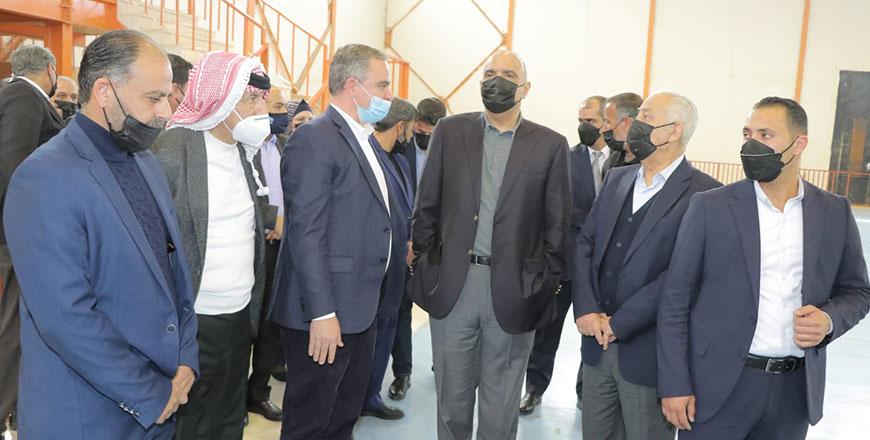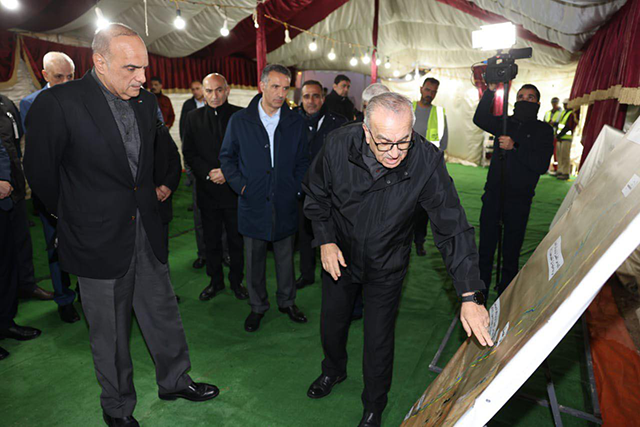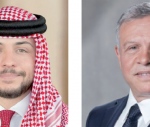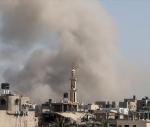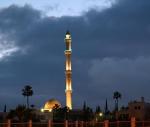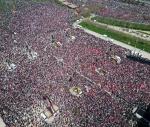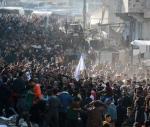You are here
PM visits Mafraq, Jerash, affirms gov’t commitment to improve public services
By JT - Mar 14,2022 - Last updated at Mar 14,2022
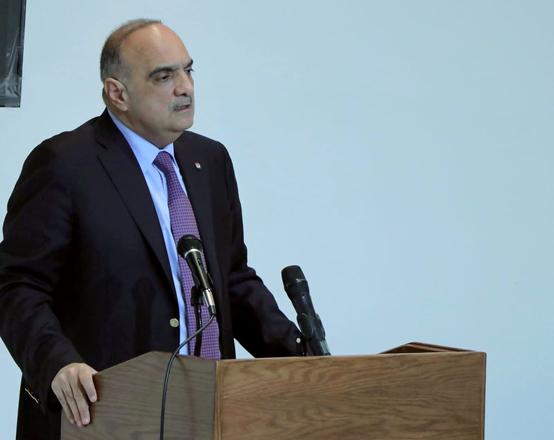
Bisher Al Khasawneh (Petra photo)
AMMAN — In implementation of Royal directives, Prime Minister and Minister of Defence Bisher Al Khasawneh on Monday visited Mafraq and Jerash governorates, the Jordan News Agency, Petra, reported.
During two meetings with representatives of the two governorates, Khasawneh affirmed the government's commitment to working diligently to provide the best services to people around the Kingdom and find solutions to the challenges facing them, highlighting improving Jordanians’ conditions is His Majesty’s the King top priority.
The COVID pandemic imposed a number of challenges that add to the set of obstacles Jordan has faced over the past decade as a result of regional crises, he said.
He pointed out that the current crisis between Russia and Ukraine had repercussions on supply chains for basic commodities, especially wheat, barley and vegetable oils, leading to a steady and rapid rise in oil prices.
Khasawneh stressed that the prices of oil derivatives have been fixed since the past two months until next month, taking into account the living conditions of people during the blessed month of Ramadan, before gradually considering the international prices of oil derivatives.
Treasury losses, as a result of stabilising the prices of oil derivatives during the months of March and April, amounted to about JD80 million, he highlighted, adding that they amounted to JD52 million during the previous two months.
Such government interventions were not governed by profit and loss, he said, stressing that the prices of basic materials in Jordan are lower than their prices in all neighbouring countries as a result of the strategic decision of His Majesty years ago to obtain silos to store wheat and barley, sparing Jordan such repercussions.
Thanks to the wisdom of His Majesty King Abdullah and his continuous follow-up on providing and storing basic materials, Jordan has maintained safe food levels in the face of the repercussions of the Russian-Ukrainian crisis, he underlined.
The prime minister directed the ministers of Industry, Trade and Supply and Interior to tighten control over markets and to refrain from being lenient with those who would threaten people's livelihoods.
In this regard, he praised the vast majority of the commercial sector, which does not resort to exploiting crises, raising prices and harming people, especially with the approaching of the holy month of Ramadan.
Jordan has endured great pressure, and has withstood all challenges, with the determination of its Hashemite leadership, its people, and their belief in its firm principles, foremost of which is the Palestinian cause, he said.
Jordan paid the price for adhering to its political principles and national stances, foremost of which is its support to the legitimate right of the Palestinian people to self-determination through the establishment of an independent, sovereign and viable state on the June 4, 1967 lines, with East Jerusalem as its capital, the prime minister said.
The Kingdom has been committed to its duty and responsibility to protect Islamic and Christian holy sites in Jerusalem in accordance with the Hashemite Custodianship, he noted.
Due to its firm stances, some forms of financial support to Jordan were ceased, Khasawneh said.
In regard to the upcoming elections, the PM urged people to effectively participate in the provincial and municipal council elections and contribute to national and developmental decision-making.
He stressed that the government is “working seriously” to strengthen the partnership between the public and private sectors, pointing out that without this partnership, Jordan will not be able to face the unemployment challenge.
Khasawneh announced that the government will soon launch a national employment programme, for which an amount of JD70 million has been allocated.
As for the new electricity tariff that come into effect in April, he noted that it will not affect more than 90 per cent of people and will stimulate the productive sectors and enhance their competitiveness.
His Majesty King Abdullah is leading a comprehensive reform project, politically, economically and administratively, as the Kingdom enters its second centenary, he said, emphasising the government's commitment to the outcomes of the National Economic Workshop at the Royal Hashemite Court.
During his meeting at Al al Bayt University in Mafraq, Khasawneh said that “Mafraq has borne the largest share of the burdens” over the past years as a result of the arrival of Syrian refugees, highlighting the governorate’s “promising future” as a development area, in which the government seeks to attract more investments.
Khasawneh issued directives to rehabilitate the Intensive Care and Emergency Departments at Mafraq Hospital, and provide it with specialised doctors and the necessary equipment.
The construction of dams and water harvesting will be expanded in a way that contributes to supporting agriculture in the governorate, he said, pledging to consider improving many of the main roads in the governorate that link the Kingdom to a number of neighbouring countries.
The government is working to implement an agricultural plan that increases the contribution of the agricultural sector to the Kingdom’s GDP and provides job opportunities in many regions, he said.
It will also refer a new investment bill to the Lower House next month, which will make “a quantum leap in the field of investment”.
Mafraq representatives and dignitaries demanded direct investment to the governorate and support for large, small and medium projects that provide job opportunities for young people.
They pointed out the need to support farmers and postpone their loans and find export markets for their products.
They highlighted the importance of improving Baghdad International Road and Mafraq Safawi Road, and the provision of the government hospital with the specialisations and equipment it needs.
During his meeting with representatives in Jerash, Khasawneh hailed the governorate’s potential and pioneering projects, stressing that the government will take all necessary measures to empower and support them through government funds.
The prime minister announced that the government will take mitigation measures to restore medical tourism in Jordan.
He stressed the revival of the industrial city in Jerash, and its transformation into an industrial and agricultural city, pointing out that this issue is being seriously discussed in consultation between the government and the local community in Jerash.
He pointed out that the establishment of a faculty of tourism and archaeology in Jerash affiliated with Balqa Applied University will be completed, and JD5 million will be allocated to inaugurate it within two years.
In regard to the Social Security Investment Fund, he noted that “it is safe and does not involve any risks”.
The prime minister affirmed the government's “seriousness” in combating all forms of financial and administrative corruption.
A lot of construction and maintenance work is required for roads in Jerash, including Jerash-Ajloun Road, as the pavement layers for this 24km road will be rehabilitated this year at a cost of JD2.5 million, and Jerash-Mafraq Road at a cost of JD1.5 million, he said.
The Amman-Jerash-Irbid road will be rehabilitated in three phases at a cost of JD7.5 million, in addition to lighting up the road, which amounts to JD120 million, to be completed this year.
He affirmed the government's support for the Jerash Festival and its cultural and economic contribution.
Related Articles
AMMAN — Prime Minister and Minister of Defence Bisher Al Khasawneh, in the presence of Royal Court Chief Yousef Issawi, on Thursday announce
AMMAN — Prime Minister Bisher Khasawneh on Wednesday inaugurated part of the Desert Road extending over 17 kilometres between Naqab and Huma
AMMAN — Jerash Governor Firas Abu Qaoud on Sunday affirmed the governorate's readiness to organise the Jerash festival, in case the governme


